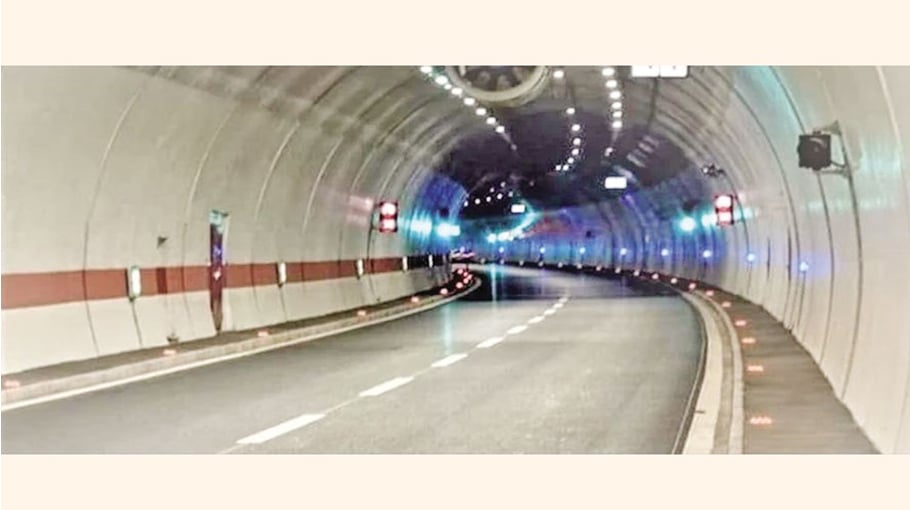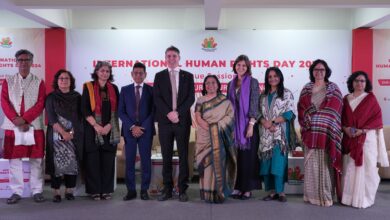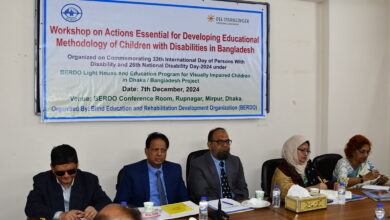PM to join Bangabandhu Tunnel’s south tube completion ceremony today

Bangabandhu Sheikh Mujibur Rahman Tunnel, the first under-river tunnel in South Asia, will open for traffic in January as over 94 percent work has already been completed.
Ahead of the grand opening, the government is going to celebrate the completion of civil work of the tunnel’s south tube today.
Prime Minister Sheikh Hasina is scheduled to virtually join the celebration from her official Ganabhaban residence.
On the eve of the occasion, Prime Minister’s Principal Secretary Dr Ahmad Kaikaus visited the celebration venue in Chattogram.
Talking to reporters, Ahmad Kaikaus informed that over 94 percent work of the ‘Bangabandhu Sheikh Mujibur Rahman Tunnel’ has already been completed.
“It is expected that all works of the tunnel will be completed in January next. The tunnel will be opened for public within January,” he added.
Responding to a question, Kaikaus said it is expected that the tunnel will contribute 0.166 percent in the growth of the national economy.
“The tunnel will greatly improve the traffic situation in Chattogram and promote economic development of the country,” he added.
He said people in Bangladesh are eagerly waiting with joy and excitement for the inauguration of the Bangabandhu Tunnel, another mega project after the Padma Bridge.
Bridges Division Secretary Md Monjur Hossain said the first tunnel in South Asia will represent Bangladesh’s pride, dignity, and ability to complete a mega structure.
He said the government has taken the project for building the port city of Chattogram like the Chinese city of Shanghai based on the “One City, Two Town” design.
Monjur said the Southern part of Bangladesh’s road network will undergo a revolutionary change due to the tunnel.
A modern communication system will be developed with Cox’s Bazar, Banshkhali, and Matarbari power plants and Matarbari deep sea port via Anwara crossing through the Karnaphuli tunnel, he added.
He said the wheels of the economy in the southern region will experience faster growth. Both the standard of living and employment will increase, he added.
Monjur mentioned that this tunnel will play a significant role in improving the economy in the long run.
Project Director Harunur Rashid Chowdhury said most of the work inside the tunnel has been completed and only the electrical lines and some technical works are pending.
The domestic and foreign engineers and workers involved in the project are advancing the work by facing challenges everyday, he added.
He said the tunnel will have a positive impact on GDP. “The economy will get a new dimension as a result of massive employment, tourism, and industrialization,” he added.
With the tunnel, Harunur Rashid said, a better and easy communication system will be developed with the Chattogram metropolis, Chattogram port, and airport located on the western end.
It will take less time and cost to carry produced goods and raw materials from the eastern industry to Chattogram port and airport, he added.
On October 14, 2016, Prime Minister Sheikh Hasina and Chinese President Xi Jinping jointly laid the foundation stone of the Karnaphuli Tunnel.
On February 24, 2019, Prime Minister Sheikh Hasina inaugurated the boring work of the first tunnel tube and on December 12, 2020. Road Transport and Bridges Minister Obaidul Quader opened the boring work of the second tube.
Starting from the Naval Academy end of Patenga in Chittagong, the tunnel goes under the river between Chittagong Urea Fertilizer Limited and Karnaphuli Fertilizer Limited factories in Anwara.
The length of the main tunnel is 3.32 km and it has two tubes, each with two lanes. These two tubes will be connected through three junctions (cross passages). These cross passages will be used for access to other tubes in case of emergency.
The length of the tunnel tube is 2.45 km and the inner diameter is 10.80 meter.
There is a 5.35 km connecting road to the west and east of the main tunnel.
The tunnel project is being implemented with the joint funding of the governments of Bangladesh and China (G2G). The total cost of the project is around Taka 10,537 crores.
The Exim Bank of China is giving a loan of Taka 5,913 crore while the Bangladesh government is funding the rest.





